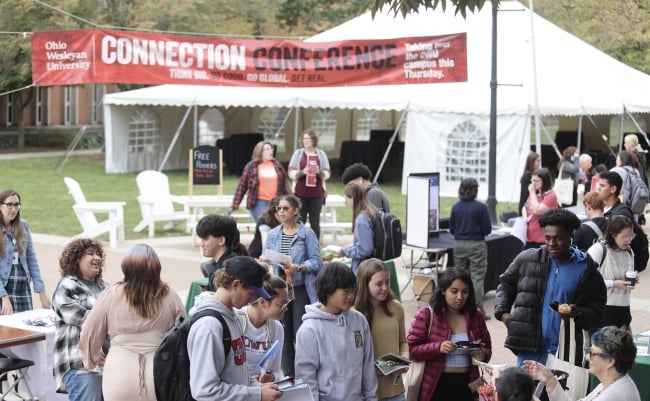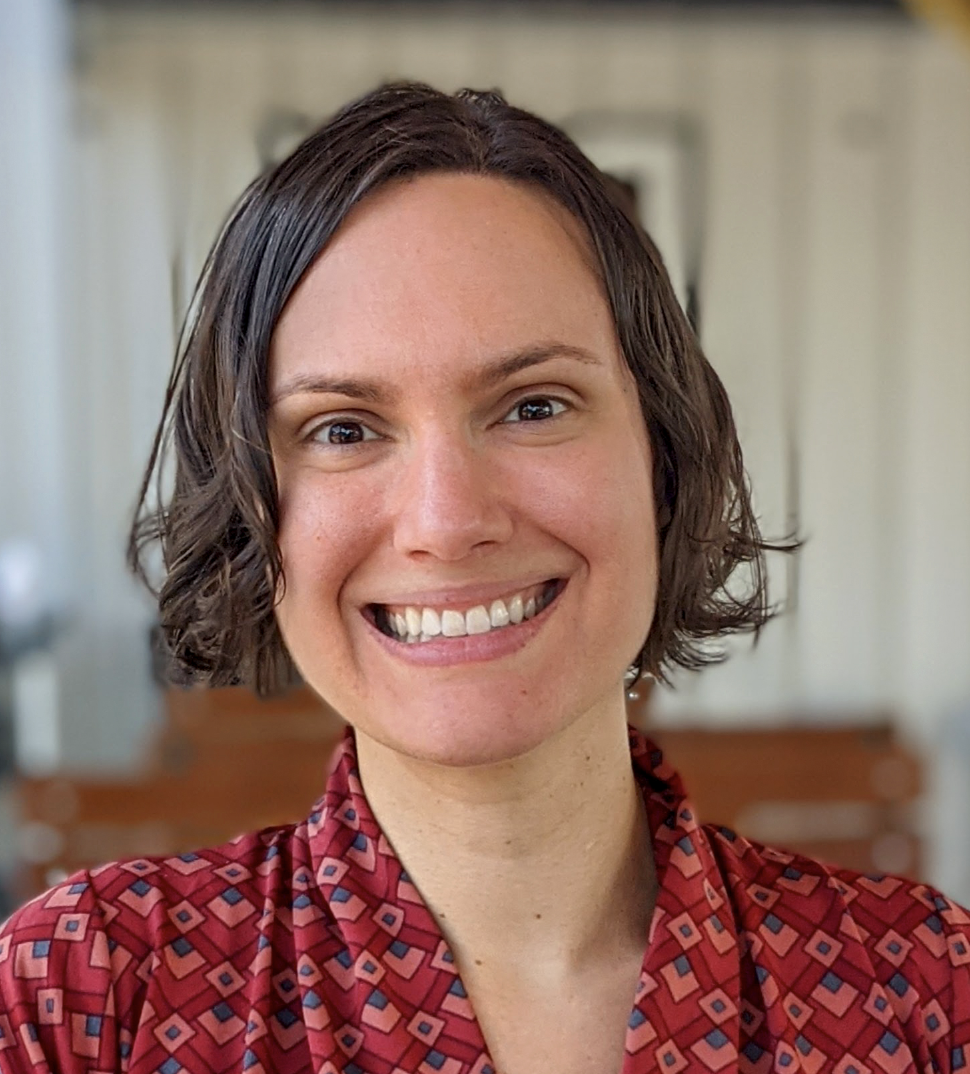You have /5 articles left.
Sign up for a free account or log in.

Lauren Hensley’s holistic advising practice at Ohio Wesleyan will focus on building community.
Ohio Wesleyan University
Ohio Wesleyan University wants to make holistic advising an “essential and transformational part” of all its students’ experiences. So said Provost Karlyn Crowley this month in announcing that the university had hired its first director of holistic advising, Lauren Hensley.
But just what is holistic advising, and how will Hensley—a scholar of student success who most recently served as interim director of Ohio State University’s Walter E. Dennis Learning Center—use the new position to drive student success on her new campus? Hensley recently chatted with Inside Higher Ed, answering these and other questions.

Lauren Hensley
Ohio Wesleyan University
Q: First off, what is holistic advising?
A: Holistic advising is a whole-campus, whole-person approach that supports student success from orientation through graduation. Advising is integrated with other campus efforts and sustained over time. It creates a context in which students shape their individualized goals and aspirations, while having a trusted relationship that enables them to authentically share their struggles and needs along the way.
As with all advising, holistic advisers are a bridge between students and campus resources. What holistic advising excels in is inviting students to bring their whole selves into the advising process, as well as equipping advisers to bring compassionate knowledge of available resources and opportunities into these discussions.
Q: How does holistic advising fit into other new or ongoing student success initiatives at Ohio Wesleyan?
A: Holistic advising is a natural fit with Ohio Wesleyan’s values as a student-centered institution. Authentic, ongoing relationships are part of what makes Ohio Wesleyan such a special place to work and to learn—and these types of relationships are at the heart of holistic advising. I have been impressed with how ahead of the curve OWU is in aligning advising practices with a liberal arts ethos.
This newly created role, director of holistic advising, is a direct outcome of the university’s Moving the Needle initiative, which brings together faculty and staff to create thoughtful programs and structures through which students thrive. Holistic advising is truly holistic at Ohio Wesleyan in that it builds upon collaborative student life and academic affairs partnerships. It is a grassroots initiative envisioned by faculty and staff that, at the same time, has the full support of campus leadership.
Holistic advising will support students’ purposeful academic choices, dovetailing nicely with the integrative and experiential nature of the new general education curriculum. Also, every student will engage in a transformative, real-world experience through the OWU Connection. Advisers will help students plan for and make the most of these opportunities.
Q: As a longtime learning center leader, you’re not the typical faculty adviser or professional adviser. How have your professional experiences prepared you for this new role and what fresh perspectives will you bring?
A: At the Dennis Learning Center [at Ohio State], I led initiatives to promote student learning, motivation, belonging and success. I learned from fantastic colleagues who had a deep commitment to enhancing students’ lives in and beyond the classroom. I had the opportunity to collaborate across the institution to support student success, develop academic programs and professional development for educators, and apply research to practice.
My experience as a mentor for the Second-Year Transformational Experience Program also provided valuable preparation. I advised students as they explored their goals and developed signature projects in areas similar to that of OWU Connection, such as internships, education abroad, research and service learning. In addition, as an instructor and team lead for Ohio State’s Bookends program, I guided students’ exploration of the general education curriculum. Building on these experiences, I look forward to developing training and support to propel students’ journeys toward discovering their values, purpose and strengths.
My Ohio State master’s and doctoral degrees in higher education and student affairs and educational psychology have equipped me to infuse theory and research into my work. I bring insights from both of these fields to understand college student development, barriers and opportunities in higher education structures, and ways of fostering success in college.
One of my most valued activities has been to create a culture of ongoing professional growth by offering training and consultation on engaging in the art of referral, supporting student transitions and boosting motivation and learning. At Ohio Wesleyan, I plan to design advising curriculum and resources based on these perspectives and to use what we learn to continue moving the field forward.
Q: Advising isn’t always recognized as a key component to student success. What is the link between advising and student success?
A: Quality advising is a core component of student success, engagement and persistence. Retention models highlight the importance of college students’ academic and social integration with their institutions, and quality advising supports both of these. My own research identifies academic advising’s essential role in navigating college life. Supportive relationships, like the ones developed in advising, help students build effective strategies for navigating college and taking on academic challenges.
Q: How do student data and partnerships with student services offices and even faculty members factor into holistic advising?
A: Using data to inform action is another area where I see Ohio Wesleyan excel. We offer self-service dashboards to understand academic trends and anticipate needs. In addition, our student success platform enables us to take a whole-campus approach to retention and care. For any campus interested in implementing holistic advising, thoughtful scoping of data is a must. What data can we already access, and what new insights could we draw from it? What areas of campus have untapped data that could help us reach students proactively? What data will help us measure our progress?
Holistic advising is a whole-campus approach. If a student would benefit from support, advisers provide a warm handoff in which a student is introduced to a specific person for timely support, rather than being bounced from one office to another. I believe our most sustainable systems are those that reflect compassion and community. When we come together, we supplement each other’s skills and knowledge, from developing a data-informed practice to connecting a student with a specific resource.
Faculty play a vital role in providing early insight into a student’s progress, allowing relevant student services to act on referrals. The affirming messages that faculty communicate about struggle and seeking help—as a natural part of college life and a sign of strength—are essential. As holistic advising continues to grow, cross-campus partnerships will help us deliver integrated and strategic support.
Q: Given the growing recognition that student well-being is a factor in student success, do you see holistic advising expanding as a practice?
A: Viewing advising holistically is an important factor in connecting students to resources and opportunities. Holistic advising is a way for each student to be seen, welcomed and engaged—to experience a sense of belonging and purpose. Through getting to know a student at a deep level and creating a space for open conversation, advisers may uncover barriers to student well-being and identify ways to address them.
I see holistic advising expanding and integrating with other valuable models, such as appreciative advising and proactive advising. But to do this well, it is essential to support advisers. This support involves providing advisers with equitable workloads, ongoing learning, growth-oriented feedback and recognition for their contributions to student success. Where we see institutions willing to devote resources in this way, I think holistic advising will flourish.
Has your college or university added a new role focused on student success? Nominate the individual serving in that capacity for a New on the Job Q&A article.




